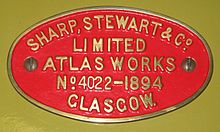Sharp Stewart and Company

Maker's plate from preserved Highland Railway "Jones Goods" No. 103
|
|
| Industry | Locomotive manufacturing |
|---|---|
| Fate | Merged |
| Predecessor | Sharp, Roberts and Company (1828–1843) Sharp Brothers and Company (1843–1852) |
| Successor | North British Locomotive Company |
| Founded | 1852 |
| Defunct | 1903 |
| Headquarters | Manchester, England; Glasgow, Scotland from 1888 |
Sharp, Stewart and Company was a steam locomotive manufacturer, initially based in Manchester, England. The company was formed in 1843 upon the demise of Sharp, Roberts & Co.. It moved to Glasgow, Scotland in 1888, eventually amalgamating with two other Glasgow-based locomotive manufacturers to form the North British Locomotive Company.
Iron merchant Thomas Sharp and mechanical engineer Richard Roberts first formed a partnership, Sharp, Roberts & Co. (about which, see also company section in article on Roberts), to manufacture textile machinery and machine tools. They opened the Atlas Works in Manchester in 1828.
They had built a few stationary steam engines, and in 1833 built a locomotive, Experiment for the Liverpool and Manchester Railway. It was a four-wheeled 2-2-0 with vertical cylinders over the leading wheels. After a number of modifications, three similar locomotives (including Hibernia) were built in 1834 for the Dublin and Kingstown Railway. Although they were relatively fast, they were too hard on the track at speed.
However, in 1834 Charles Beyer also joined the firm and contributed to its success in locomotive building as Roberts soon delegated most of the locomotive design work to him. A new 2-2-2 design was soon produced with horizontal inside cylinders under the smokebox and additional bearings to support the crank axle. Around 600 of these Sharp Single locomotives were built between 1837 and 1857. Ten of the first were sold to the Grand Junction Railway, with the "Sharpies" becoming a standard to compare with the "Bury" engines.
...
Wikipedia
